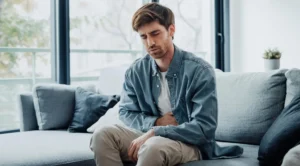We offer medical detox and multiple addiction treatment options in our
luxury treatment centres in Port Hope, Cobourg, and Ottawa.
What Should You Know About Hydroxyzine and Addiction?
Your doctor hands you a prescription for hydroxyzine. "It's just an antihistamine," they say. "Much safer than Xanax." But weeks later, you're counting pills and worrying about your next refill. Thousands of Canadians take hydroxyzine for anxiety, allergies, and sleep problems. Most never expect to develop any attachment to it. Yet some find themselves unable to skip doses or function normally without this "harmless" medication.
Key Takeaways
- Your mind can get hooked: Physical addiction won't happen, but emotional dependence on hydroxyzine's calming effects catches people off guard
- Stopping isn't always smooth: Quitting cold turkey brings back anxiety worse than before, plus headaches and sleepless nights
- Booze makes it dangerous: One drink plus hydroxyzine can knock you out or worse - never mix them
- It hangs around: You feel effects for hours, but traces of it stay in your system for days afterward
- Red flags are subtle: Taking extra pills or panicking about running out means trouble's brewing
- Get help early: Doctors can prevent problems and help you quit safely when the time comes

What Is Hydroxyzine and Why Do People Use It?
Hydroxyzine was originally developed for fighting allergies but quickly found its way onto psychiatrists' prescription pads. Sold as Atarax and Vistaril, this old-school antihistamine does double duty - blocking histamine reactions while messing with serotonin in your brain. That combo calms jittery nerves without the knockout punch of benzodiazepines.
Doctors write prescriptions for hydroxyzine when you have:
- Panic attacks that won't quit
- Hives and itching driving you crazy
- Insomnia from racing thoughts
- Surgery jitters before procedures
- Detox shakes when quitting alcohol
Think of it as your brain's volume control. Overactive worry centres get turned down while allergy responses get blocked. No euphoric high means no desperate cravings, but that peaceful feeling still hooks some people.
Is Hydroxyzine Actually Addictive?
Here's the thing - hydroxyzine won't grab you by the throat like heroin or cocaine. No shaking withdrawals. No desperate 3 AM pharmacy runs. But your brain can still decide if it needs this stuff to cope with life.
Real addiction means physical dependence. Your body chemistry changes, demanding more drug just to feel normal. Hydroxyzine doesn't pull that trick. Stop taking it tomorrow and you won't get the sweats or seizures.
What happens instead feels sneakier. You take hydroxyzine for anxiety. It works. Months pass. Suddenly you can't imagine facing a stressful day or falling asleep without those little pills. That's psychological dependence - when your mind insists it needs chemical backup to handle ordinary situations.
True addiction looks like:
- Needing bigger doses constantly
- Violent sickness when stopping
- Stealing or lying for drugs
- Life falling apart from use
Hydroxyzine dependence feels like:
- Freaking out about empty bottles
- Popping pills for minor worries
- Sleepless nights without medication
- Panic at the thought of quitting
How Can You Recognize Signs of Hydroxyzine Abuse?
Hydroxyzine abuse creeps up slowly. No dramatic rock bottom moments or needle tracks. Just small choices that snowball into bigger problems nobody sees coming.
Maybe you double up doses when anxiety spikes. Perhaps you visit different doctors for extra refills. Could be you're washing hydroxyzine down with wine for better sleep. These seemingly innocent tweaks signal trouble ahead.
Watch for these patterns:
- Crushing or chewing tablets for faster effects
- Hoarding pills "just in case"
- Taking medication for every emotional hiccup
- Getting defensive about your prescription habits
- Lying about how much you're actually taking
- Shopping around for multiple prescriptions
Your family might notice personality shifts before you do. Sleeping too much, spacing out during conversations, stumbling around the house. Some people become obsessed with their pill schedule, planning everything around medication timing.
The scariest part? It feels reasonable when you're doing it. "I just need extra help this week." "The doctor said as needed, right?" Before you know it, those pills control your daily routine instead of helping with occasional problems.

What Makes Hydroxyzine and Alcohol Such a Dangerous Combination?
Picture this: you take hydroxyzine for sleep, then decide one glass of wine won't hurt. Next thing you know, you're waking up on the bathroom floor with no memory of how you got there.
Both substances hit your central nervous system like sedative sledgehammers. Separately, they're manageable. Together, they can shut down vital functions without warning. Your breathing slows. Coordination vanishes. Memory stops recording.
The dangers stack up fast:
- Blackout driving - you think you're fine but you're not
- Dangerous falls - especially brutal for older folks
- Memory holes - losing hours of your life
- Breathing problems - potentially fatal respiratory depression
Even moderate drinkers get blindsided by this combination. One beer plus hydroxyzine can hit like a six-pack. The effects linger for hours after you think both substances have worn off.
Smart money says skip alcohol entirely while taking hydroxyzine. If you've been drinking, wait two full days before taking any antihistamine. After taking hydroxyzine, give it 24 hours before touching alcohol.
What Are Hydroxyzine Withdrawal Symptoms and How Long Do They Last?
Quitting hydroxyzine won't put you in the hospital, but it's no picnic either. Your body and mind have gotten used to chemical assistance. Taking that away creates a bumpy readjustment period.
The anxiety hits first and hardest. Remember those worried thoughts hydroxyzine was suppressing? They come roaring back with interest, often worse than before you started taking medication. Sleep goes to hell. Headaches pound. The stomache churns with nausea.
Most people ride out the worst symptoms in 7-10 days. Anxiety and sleep problems can drag on for weeks, especially if those were your original complaints. Your brain needs time to remember how to calm itself naturally.
Several things make withdrawal rougher:
- Taking high doses for months
- Stopping abruptly instead of tapering down
- Having severe anxiety to begin with
- Using other drugs or alcohol
- Poor general health or advanced age
Smart doctors create stepping-down schedules. Cut your dose by 25% every few weeks instead of stopping cold turkey. Your nervous system gets time to adjust gradually rather than getting shocked into chaos.
Who Should Avoid Hydroxyzine and How to Use It Safely?
Some people shouldn't mess with hydroxyzine at all. Others need extra caution and medical babysitting. Know which category you fall into before swallowing that first pill.
High-risk groups include:
- Pregnant women (unknown effects on babies)
- Senior citizens (falls and confusion risks)
- Heart patients (rhythm problems possible)
- Liver disease sufferers (can't process medication properly)
- Heavy medication users (dangerous interactions)
Using hydroxyzine safely means following directions exactly. Don't get creative with dosing or timing. Alcohol stays off-limits completely. Keep honest communication with your doctor about how the medication affects you.
Pay attention to warning signs your body sends. Extreme drowsiness lasting all day isn't normal. Neither is stumbling around like you're drunk or forgetting conversations you just had. Report these problems immediately.
Store pills securely away from kids, visitors, or anyone with addiction problems. Never share your prescription, even with family members having similar symptoms. What helps your anxiety might hurt someone else. If you're getting treatment at the Canadian Centre for Addictions, tell your counselors about any hydroxyzine use. They need the full picture to keep you safe during recovery.

When Should You Seek Professional Help?
Admitting you need help with a "harmless" antihistamine feels embarrassing. People understand heroin addiction or alcoholism. Hydroxyzine dependency sounds made up, even to you.
But if you're sneaking extra pills, lying about your dosage, or panicking about running out of medication, something's wrong. These feelings are real and they matter, regardless of what drug triggered them.
Call your doctor immediately if you can't function without hydroxyzine, keep increasing doses without permission, or feel desperate when supplies run low. Don't wait for things to get worse.
Emergency situations include trouble breathing, severe confusion, heart racing or stopping, or thoughts of hurting yourself. Get to a hospital fast - don't try handling these problems alone.
FAQ
Can you become physically addicted to hydroxyzine?
No, hydroxyzine doesn't cause the physical addiction you see with opioids or alcohol. Your body won't go into dangerous withdrawal if you stop. But your mind can definitely become dependent on the calming effects.
How long do hydroxyzine withdrawal symptoms last?
Most people feel rough for 1-2 weeks after stopping, with anxiety and insomnia being the biggest problems. Some folks struggle with sleep for a month or more, especially if that's why they started taking hydroxyzine originally.
Is hydroxyzine safer than Xanax for anxiety?
Generally speaking, yes. Hydroxyzine isn't a controlled substance and won't cause physical dependence like benzodiazepines do. However, Xanax works faster and stronger for panic attacks - there's always trade-offs.
Can hydroxyzine show up on drug tests?
Standard workplace drug screens don't look for antihistamines like hydroxyzine. Special lab tests can find it in your urine for a few days, but nobody's going to order those unless they have a specific reason.
What should I do if I think I'm dependent on hydroxyzine?
Don't quit cold turkey - that'll just make your anxiety worse. Talk to your doctor about slowly reducing your dose while learning other ways to manage stress and sleep problems. Counseling really helps too.






